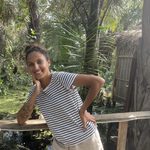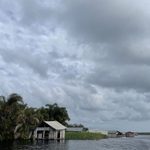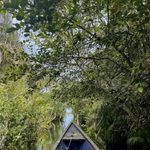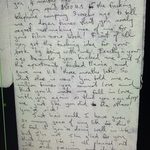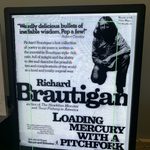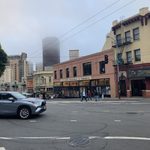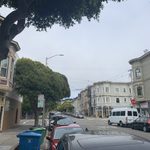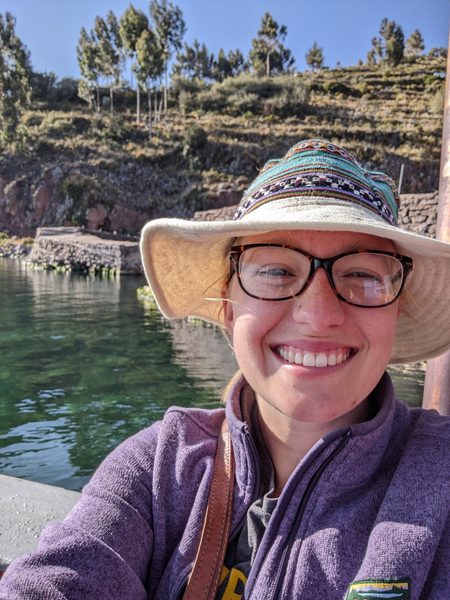Curious about what you can do on a Carleton-Funded Fellowship? Read about these students who went on CFFs during Summer 2022! Also check out our Instagram page with spotlights on more students!
Jump To:
Alicia Telle ’23
Alicia received funding from the Richard Salisbury Fellowship.
Where have you been and what have you been doing?
This summer I returned to Nzulezo, Ghana – the only stilt village in Ghana and one of two in Africa. I was building upon research I conducted last year on my OCS program, but this time more focused on tourism and development. I conducted interviews and participant observations for my comps.
What has been the most interesting/rewarding part of what you’ve been doing?
The most interesting aspect of my experience was definitely coping with the rainy season. I was not anticipating it to be so intense! It was a challenge, to say the least. However, the most rewarding part of my experience has been coping with the challenges and still managing to conduct thorough and meaningful research and immerse myself in a community very different from mine. Another interesting part of my research has been meeting new people from all around the world who visited Nzulezo and sharing my research with them! I met people from Australia, the US, Germany, and even two Bahamians (where I am from)!!
How will the experience you’ve been having add to your Carleton education?
This experience has definitely improved my qualitative research skills, my ability to communicate with people of different backgrounds and cultures, and my ability to adapt to new and potentially challenging situations.
What would you tell someone applying for a Carleton-funded fellowship?
Firstly, I would suggest choosing a project/idea that you are really passionate about and interested in. I would say that there is only *so* much you can prepare for, and to expect that certain things just won’t go to plan. I would also suggest to those who do not have much experience living/being outside of the US, to *truly* grasp that people live differently and that there is a high likelihood that your American norms/standards are not shared. Accept that people operate differently and try to shed those preconceived notions.
Sawyer Stone ’23
Sawyer received funding from the Larson International Fellowship.
Where have you been, and what have you been doing?
I spent a week and a half in Israel exploring Jerusalem’s religious history and visiting the significant religious sites to gain an appreciation for the history at the center of the Abrahamic faiths. I also spent three days in Tel Aviv, which coincided with the start of Pride month, and was able to discuss different experiences of sexuality across the globe with a wide array of people.
The experience of seeing such varied cultures and history and how one place had been preserved and built on by so many different groups and civilizations over time was incredible.
What has been the most interesting/rewarding part of what you’ve been doing?
One of the most fascinating elements was the discussions I had with the people in Israel, the random people I met on the trip, and the experience of seeing how differently the world functioned in Jerusalem.
I met several people on their Birthright trip and discussed the experiences they had, along with locals who have seen how things have changed over the last 50 years and I listened to their perspectives on the rest of the world.
The most interesting experience was seeing how the gardens of Gethsemane Temple, Temple Mount, and Mount of Olives within sight of one another, all overlooking the Tomb of the Virgin Mary. It reflects how one small area has defined so much of the world’s religious history through its influence.
How will the experience you’ve been having add to your Carleton education?
This trip gave me perspective on how the world functions outside the US and how the wider world sees Americans. People often make assumptions about me and my political beliefs based on how I present myself and my status as an American in Isreal. I think it will impact how I write my comps and how I view my relationship as an individual with how other countries perceive me.
What would you tell someone applying for a Carleton-funded fellowship?
It’s worth it to try even if you don’t get it – the opportunity is there, and you should go for it! This kind of experience is something you can only honestly do in college, so taking advantage of the opportunity is something you shouldn’t miss out on.
-
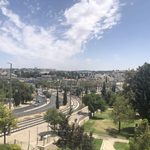 Taken from on top of the walls of the old city, I thought this picture showed a cool blend of the ancient and the new.
Taken from on top of the walls of the old city, I thought this picture showed a cool blend of the ancient and the new. -
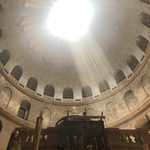 This was the immensely important site in the Christian faith where Christ is said to have been crucified, and where he was entombed. It was really moving to see how important it was to the people who visited, and how much work and reverence have gone into this site for thousands of years.
This was the immensely important site in the Christian faith where Christ is said to have been crucified, and where he was entombed. It was really moving to see how important it was to the people who visited, and how much work and reverence have gone into this site for thousands of years. -
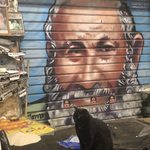 This was just one of many great pieces of street art I saw while visiting.
This was just one of many great pieces of street art I saw while visiting. -
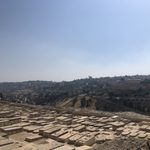 Ancient Jewish graves with a view of the city behind them. I thought it was an interesting look at how different this is from American culture today.
Ancient Jewish graves with a view of the city behind them. I thought it was an interesting look at how different this is from American culture today. -
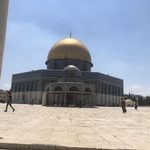 My visit to temple Mount was amazing and showed off the intersection of Abrahamic faiths in Jerusalem.
My visit to temple Mount was amazing and showed off the intersection of Abrahamic faiths in Jerusalem.
Soren Eversoll ’24
Soren received funding from the Independent Research Fellowship.
Where have you been, and what have you been doing?
Over this summer I’ve been conducting research in the Bay Area about the 1960’s counterculture writer Richard Brautigan, and the impacts of his life and work within the broader context of the hippie movement that was primarily located in San Francisco’s Haight-Ashbury neighborhood. To do this, I spent time going through Brautigan’s papers in UC Berkeley and exploring the areas that he frequented.
What has been the most interesting/rewarding part of what you’ve been doing?
The most rewarding part of my work has been the ability to translate this real historical research in the form of an extended creative writing piece, which has allowed me to recreate Brautigan’s world in a way that feels extremely vivid. It’s also been rewarding to have been able to spend time in an area of the U.S. that I’m not originally from, and see the way the Bay Area has transformed from the happy-go-lucky, communal attitudes of Brautigan’s days.
How will the experience you’ve been having add to your Carleton education?
My experience this summer will directly enhance my Carleton education because I plan on expanding this project into my senior comps. Additionally, writing nearly every day this summer has greatly improved my skill and confidence in something that will translate directly into the writing I’ll do in class.
What would you tell someone applying for a Carleton-funded fellowship?
I would tell someone who is planning to apply for a Carleton fellowship to enter the process with a very clear goal as to what they intend to do, but to always remain open over their course of their research/experience for new ideas and opportunities they could follow, provided they don’t stray too far from the original goals they had in mind.
Sophia Maag ’23
I used the independent research fellowship to conduct research for my comps. I originally planned to look at sense of place in Bay Area farmers market, but ended up changing my comps topic (and was told I could still use the fellowship money for that). The resulting research centered around Ecstatic Dance in the Bay Area.
Ecstatic Dance is a form of unstructured dance akin to a moving meditation. Many people dance alone, but some do contact dances, whether that means simply touching hands, embracing for multiple minutes, or rolling over one another. While there is no talking allowed on the dance floor, cheers and whoops are permitted and are a fun part of the event. Ecstatic Dance is a sober event, as one intent is to “get high” from pure dance.
I got introduced to Ecstatic Dance by my sister, who lives in San Francisco and has attended Ecstatic Dance events at The Church of 8 Wheels for the past year. This summer, I was able to join her and dozens of other smiling people at the old church from 11am to 1pm each Sunday. (I also attended a Wednesday night Ecstatic Dance in Oakland).
To me, Ecstatic Dance is an example of a healing community. Some Ecstatic Dance events are specifically targeted at emotional release and grief. Even at the standard Church of 8 Wheels session, I witnessed many people “going through something.” That is, shaking violently, screaming, or getting in other trance-like states. I even found myself going into a deep dance trance at the first Oakland Ecstatic Dance (which reopened while I was in CA (after being closed because of COVID-19) I attended). Ecstatic Dance brings people together who want to share space and feelings, and even pain.
My comps is going to look at how Ecstatic Dance can be seen as a type of alternative healing practice, and one related to a type of spirituality. Although Ecstatic Dance does not brand itself with any formal spirituality, it is most certainly present, as seen through breathing exercises, small meditations, and sound baths. I talked to some dancers that said they use Ecstatic Dance as a type of therapy. Emotion is tied directly to their dance, and they use the movement to “work through things.” I myself found a deeply healing nature to the movement. Without a leader or any instructions, the body is allowed to move as it likes, and the container of Ecstatic Dance is largely judgment-free.
Having been a student my whole life, I’ve always thought of learning as a very linguistic and thought-heavy thing. This summer changed that for me. The nature of my comps topic allows for more embodied learning. Being able to go to Ecstatic Dance twice a week, to connect with strangers through dance, jumping up and down and throwing my body any which way, taught me in a very non-academic way, but one which allowed me to hold the knowledge in my physical body. As someone who is very interested in a career in the healing world (whether that is as a physical therapist, massage therapist, and so on), this type of embodied learning was very eye-opening to me. It was also a good reminder that there are many different ways to learn. Reading is different from writing, which is different from speaking, which is different to practice and action and so on.
I’m so thankful to the fellowships office for having provided me with this opportunity. It allowed me to pursue something that I’m very passionate about and to bring it into an educational role (conducting further research and interviews). Comps is daunting, but being able to spend over six weeks participating in what I’m researching has given me invaluable experience, which I’ll rely on heavily this fall and winter.
Hannah Sheridan ’23
Hannah received funding from the Larson International Fellowship.
Where have you been and what have you been doing?
I have been in Dublin researching Caitrona Lally’s novel Eggshells in the manner of the Mapping Dubliners Project about James Joyce’s short story collection. My work has involved extensively walking the city and creating maps of all the walking routes the main character in Eggshells takes throughout the novel.
What has been the most interesting/rewarding part of what you’ve been doing?
The longer I stayed here, the more I began to feel like I was actually living in Dublin. A few days before I left, I realized I was no longer coasting on the surface of the city, but actually beginning to understand some of its subtleties and deeper character. This, in turn, has helped with my research as much of it has to do with the nature of the city itself.
How will the experience you’ve been having add to your Carleton education?
I think I know what I want to write my COMPS about! This has been a completely different kind of learning experience than what I can gain in a classroom. In Dublin, my ideas about the relationship between narrative voice and place build organically. I read the book, go to the place, and I think “Oh, that’s what they meant!” I have made many connections between the narrator’s voice and the physical location that I would not have discovered otherwise.
What would you tell someone applying for a Carleton-funded fellowship?
Think ahead, talk to your professors, and talk to Marynel. It is an invaluable experience, and one that I think is highly unique to Carleton. When else will I be paid to go to Europe and think about the books I love? Identify something that makes you truly excited and the project proposal will come.
-
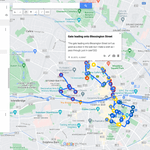 This is a veryyyyyyyy preliminary draft of one of the maps I am working on.
This is a veryyyyyyyy preliminary draft of one of the maps I am working on. -
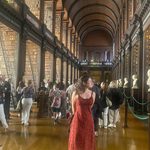 Hannah in the Long Library in Dublin
Hannah in the Long Library in Dublin -
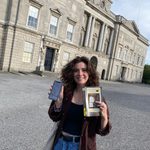 Hannah holding up a map from Mapping Dubliners and also her copy of Dubliners
Hannah holding up a map from Mapping Dubliners and also her copy of Dubliners -
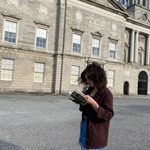 Hannah consulting Dubliners
Hannah consulting Dubliners -
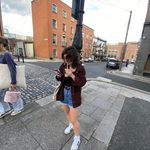 Checking map
Checking map -
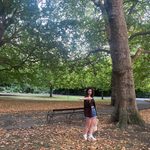 Hannah brandishing a baguette in St. Stephen’s Green
Hannah brandishing a baguette in St. Stephen’s Green -
 Believe it or not, this Foot Locker was one of the locations I had to find for my Eggshells research as it is mentioned in the book
Believe it or not, this Foot Locker was one of the locations I had to find for my Eggshells research as it is mentioned in the book -
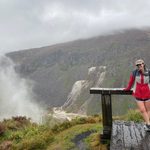 Taking a day outside the city to hike in Glendalough national park
Taking a day outside the city to hike in Glendalough national park -
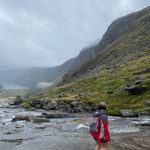 Glendalough part 2
Glendalough part 2
Grace Prince ’25
Grace received funding from the Independent Research Fellowship.
Where have you been and what have you been doing?
This summer I participated in an independent research fellowship working within the ecology lab of Professor Sarah Hobbie at the University of Minnesota. I was working directly with Carleton alum Sally Donovan and assisting with her research focusing on soil and plant biota within the Long Term Ecological Research area of Minneapolis/St. Paul. For the first part of the summer we were in the field collecting and taking soil measurements in parks across the Twin Cities Metro Area. The second part of the summer we were mostly in the lab, conducting experiments evaluating the health and different metrics of the soil such as soil texture analysis, nitrogen mineralization, and gravitational water content.
What has been the most interesting/rewarding part of what you’ve been doing?
I think one of the most rewarding parts of what I have been doing was getting to the point in the summer where I had enough experience in the lab to lead my own experiment with the samples we collected in the field earlier in the summer. I got to analyze the soil texture of soils from across regional parks in the metro area, connecting some knowledge I already had about learning about soil in a geology class at Carleton with real world samples. Additionally it has been rewarding forming connections with Carleton alums and professionals in the field of ecology and higher education.
How will the experience you’ve been having add to your Carleton education?
The experience will add to my Carleton education by adding research and lab experience that would have been harder to obtain at Carleton and furthering my knowledge of soil outside of geology classes. I was able to apply concepts learned at Carleton such as the soil texture triangle and apply them to soil analyses this summer. I am also adding experience carrying out lab procedures common within the fields of ecology and geology.
What would you tell someone applying for a Carleton-funded fellowship?
I would tell someone applying for a Carleton fellowship to be curious. Be sure to ask a lot of questions and learn as much as you can from those you are working with because it is a really valuable opportunity to make connections in a potential field of interest. I would also recommend having an open mind and just being open to new experiences because they may be chances to grow and learn.
-
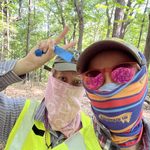 Myself in the front with Sally Donovan ’16 in the field. There were quite a lot of bugs.
Myself in the front with Sally Donovan ’16 in the field. There were quite a lot of bugs. -
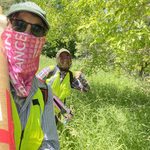 Sally and I in the field.
Sally and I in the field. -
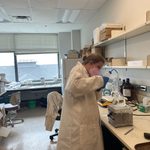 Grace preparing a stock solution.
Grace preparing a stock solution. -
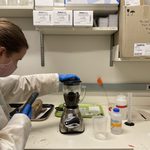 Grace blending the soil and stock solution.
Grace blending the soil and stock solution. -
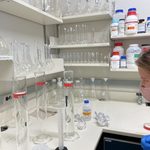 Grace measuring out solution.
Grace measuring out solution.
Sophie Baggett ’23
Sophie received funding from the Larson International Fellowship. Dr. Sarah Kennedy and her team received funding from a Student Research Partnership (SRP) through the Humanities Center.
Where have you been and what have you been doing?
I was in and around Puno, Peru with Dr. Sarah Kennedy and her archeological team. My project was to head community outreach for Sarah’s work with heavy metals. I interviewed site landowners, NGO employees, and government officials to determine both community knowledge about and current practices for disseminating information about heavy metals. Our long term goal is to use what we learned this year to distribute the results of Sarah’s archeological studies and present our findings of best practices working with the community.
What has been the most interesting/rewarding part of what you’ve been doing?
The most interesting part has been finding out just how many people and organizations are stakeholders in this project. It’s been somewhat overwhelming, but I hope we can present Sarah’s results to all stakeholders in an accessible way and maintain sustainable, dialogue-based relationships with them.
How will the experience you’ve been having add to your Carleton education?
As an aspiring MD-PhD, it’s important to me to understand how information related to health and wellbeing flows from academia to the community. This project helped me realize the importance of having these conversations responsibly and thoughtfully.
What would you tell someone applying for a Carleton-funded fellowship?
Don’t be afraid to apply! Even if it’s a project that’s not directly related to your major, a Carleton-funded fellowship could help you explore a related or connected field, or an altogether separate passion.
For more information about this project, especially what Dr. Sarah Kennedy was doing with her archeological team, check out this article written by Erica Helgerud.
